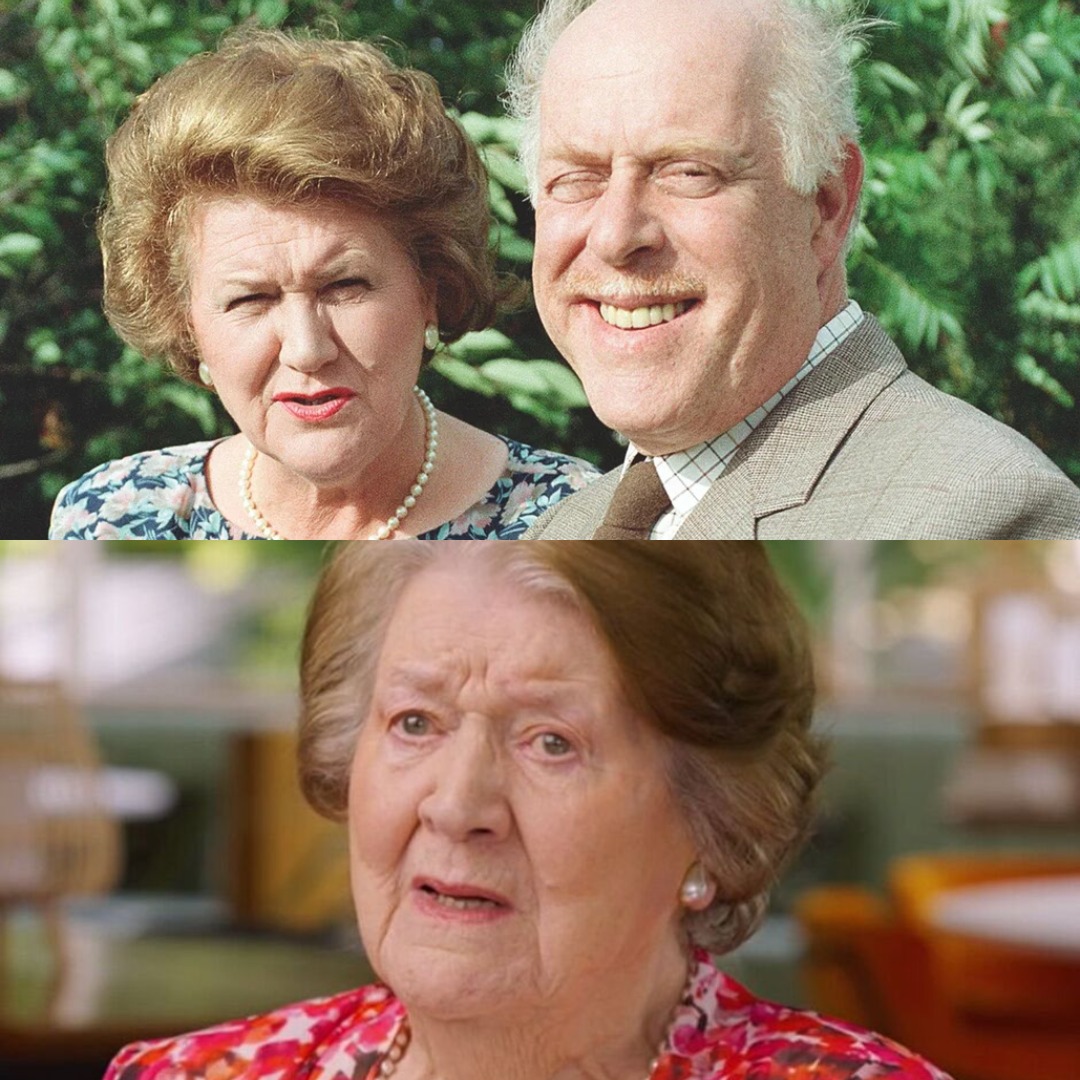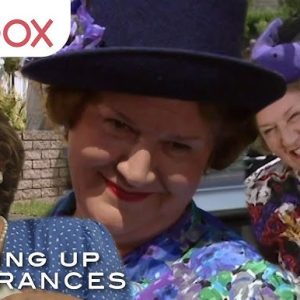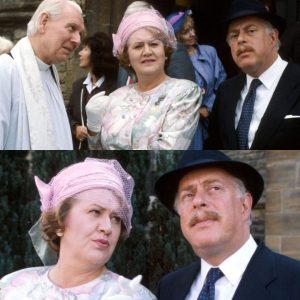“Too Good to Remake”: Dame Patricia Routledge Defends the Legacy of Keeping Up Appearances
By [Your Name], Entertainment Correspondent
In a television era saturated with reboots, remakes, and reimaginings, Dame Patricia Routledge has delivered a resounding and unambiguous verdict on one of British television’s most cherished sitcoms: Keeping Up Appearances was perfect as it was—and should be left untouched.
In a recent BBC Four retrospective Remembering… Dame Patricia Routledge Remembers Keeping Up Appearances, the venerable actress reflected with warmth, clarity, and unmistakable pride on her most iconic role: Hyacinth Bucket (that’s “Bouquet,” if you please). But while fans continue to rewatch the series with undying affection—and Hollywood eyes every old hit for a potential modern makeover—Routledge made her position on a possible remake crystal clear: “The original was too good to ever be replicated.”
That statement, simple yet striking, resonates like a bell through the halls of television history. In an age of creative recycling, where legacy shows are often revived in hopes of recapturing past magic, Routledge’s refusal to participate in or even watch a remake is more than a personal choice—it’s a passionate defense of artistic integrity.
A Show That Captured Lightning in a Bone China Teacup
When Keeping Up Appearances first aired in 1990, few could have predicted that a sitcom about a woman obsessed with social status would become a cultural phenomenon. But Hyacinth Bucket, with her forced elocution, floral arrangements, and infamous candlelight suppers, didn’t just charm audiences—she bewitched them.
Over five seasons, the show chronicled Hyacinth’s unrelenting (and often catastrophic) attempts to ascend the social ladder. Her long-suffering husband Richard, her working-class sisters Daisy and Rose, and the ever-embarrassing “Daddy” became foils to her delusions of grandeur. It was a brilliant satire of British class aspirations, couched in warm domestic comedy, and delivered with razor-sharp timing.
Routledge’s performance was nothing short of masterful. Her Hyacinth was at once absurd and sympathetic—a woman driven by a need for validation, blind to her own contradictions, and clinging to appearances as a shield against a world that often refused to see her as she wished to be seen.
To attempt to replicate that balance, Routledge now insists, would be a futile endeavor.
“Of Its Time”—And All the Better for It
In her BBC interview, Routledge was adamant that the alchemy of Keeping Up Appearances relied on more than just clever scripts and comic gags—it was a product of its time. “What made Keeping Up Appearances so unique was the talent of the cast, the writing, and the timing,” she explained. “It worked perfectly with the people involved. I just don’t think it would have the same impact now.”
Her words underscore a rare understanding in an industry that often assumes newer means better. To Routledge, the show’s success wasn’t just a matter of format—it was chemistry. Roy Clarke’s writing was incisive yet warm, capturing British social anxieties without ever veering into cruelty. The ensemble cast, from Geoffrey Hughes’s laid-back Onslow to Judy Cornwell’s lovable Daisy, brought layers of depth to what could have been mere caricature.
Recreating that particular blend today, she suggests, would strip the series of its authenticity. It wasn’t just about the jokes—it was about the truth behind them.
The Irreplaceable Hyacinth
No conversation about Keeping Up Appearances can avoid its beating heart: Hyacinth herself. She is, quite simply, one of the most iconic characters in the history of British television. Pretentious, deluded, and endlessly theatrical, Hyacinth’s every appearance is a masterclass in comic tension and emotional vulnerability.
And yet, Routledge never played her as a villain. “Hyacinth wasn’t just ridiculous,” she reflected. “She was human. She wanted to be seen. She wanted to matter.”

This empathy, delivered through Routledge’s formidable talent, is what made Hyacinth endure. It’s why viewers still quote her lines, decades after they first aired. It’s why fans across generations still find her hilarious and heartbreaking in equal measure.
To recast Hyacinth would not simply be replacing an actress—it would be erasing the core of what made her real. As Routledge rightly observes, “The character can’t be done again. She was of her time, and that time is past.”
A Legacy Worth Protecting
The cultural significance of Keeping Up Appearances extends well beyond the sitcom format. It offered a biting yet affectionate commentary on Britain’s rigid class system, on the illusions people cling to in pursuit of status, and on the chaos that ensues when appearances matter more than connection.
Hyacinth’s desperate phone calls to the church vicar, her mortification at Onslow’s arrival in a beat-up car, her theatrical concern for “my Sheridan”—all served as mirrors to society’s obsession with upward mobility. And yet, the humor never mocked for cruelty’s sake. It exposed the absurdity of societal pretensions, but also the very real pain behind them.
Routledge, now Dame Patricia, understands this legacy well. Her refusal to entertain a reboot is not mere stubbornness—it is a fierce commitment to the original show’s truth. In an age where entertainment is too often treated as disposable, her words are a reminder that some creations are too carefully crafted, too meaningful, to be turned into brand extensions.
For the Fans, Forever
For millions, Keeping Up Appearances remains more than nostalgia—it’s a comfort. A world where chaos is gently resolved, where laughter comes easily, and where the pretensions of one woman remind us all not to take ourselves too seriously.
The show still airs globally, and its episodes remain among the BBC’s most requested reruns. From its unforgettable opening music to Hyacinth’s frantic corrections of her surname, it is the kind of television that feels like home. No reboot can replicate that emotional resonance. No modern cast can reforge the chemistry that once graced British screens.
Patricia Routledge knows this. She lived it. And she wants the show to rest with dignity—not dragged out for one more ratings stunt or nostalgic cash grab.
Final Curtain, Lasting Applause
Dame Patricia Routledge’s legacy as Hyacinth Bucket is secure. Her contribution to British comedy is unmatched, and her devotion to preserving the integrity of Keeping Up Appearances only deepens the respect fans have for her. In a world increasingly driven by reinvention, her stance is a bold—and much-needed—call for preservation.
As she so eloquently put it, “The original was too good to remake.” And for once, audiences everywhere can agree—some things really are better left as they were.
Would you like a shorter version of this for social media or press release use?





